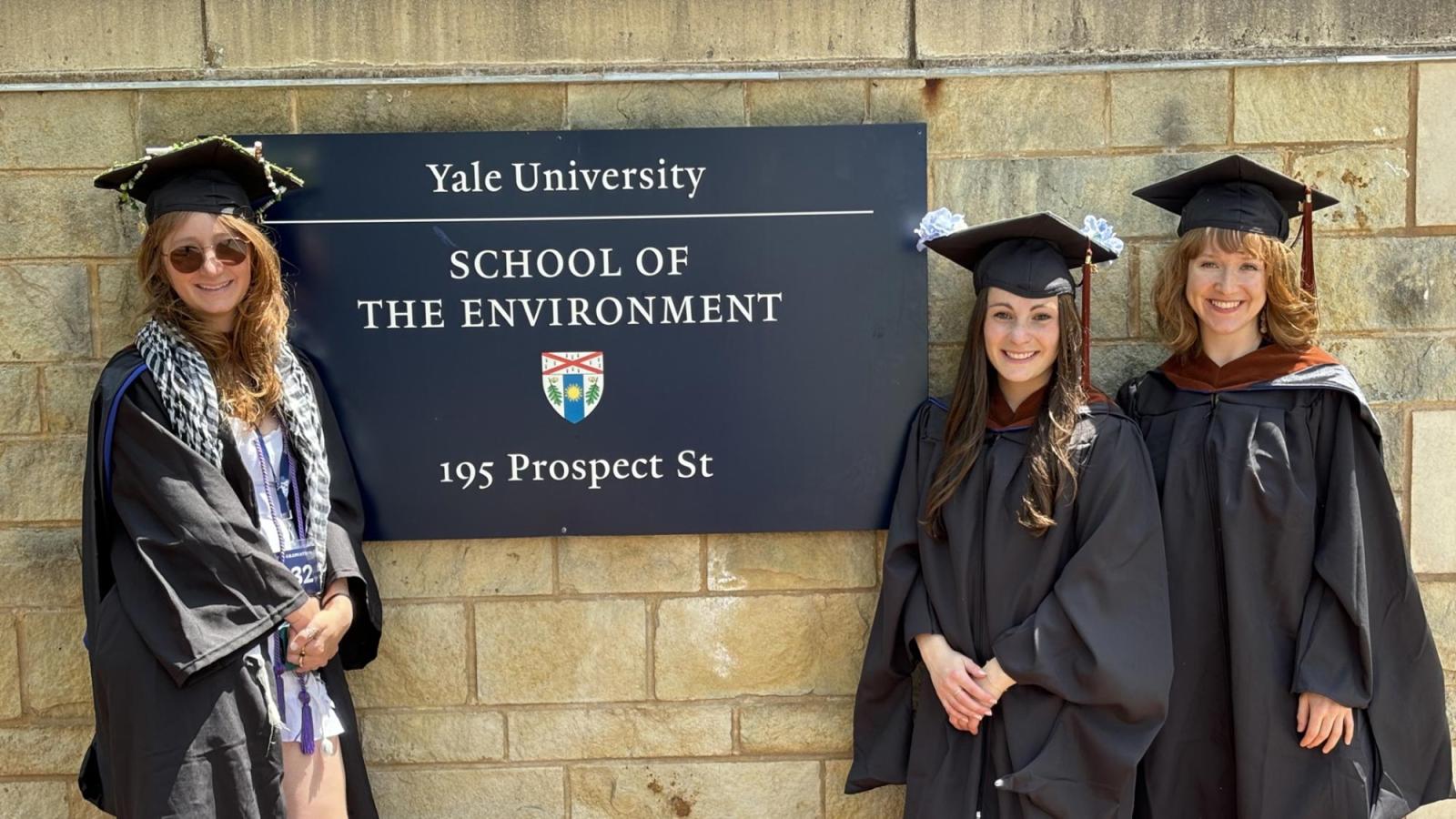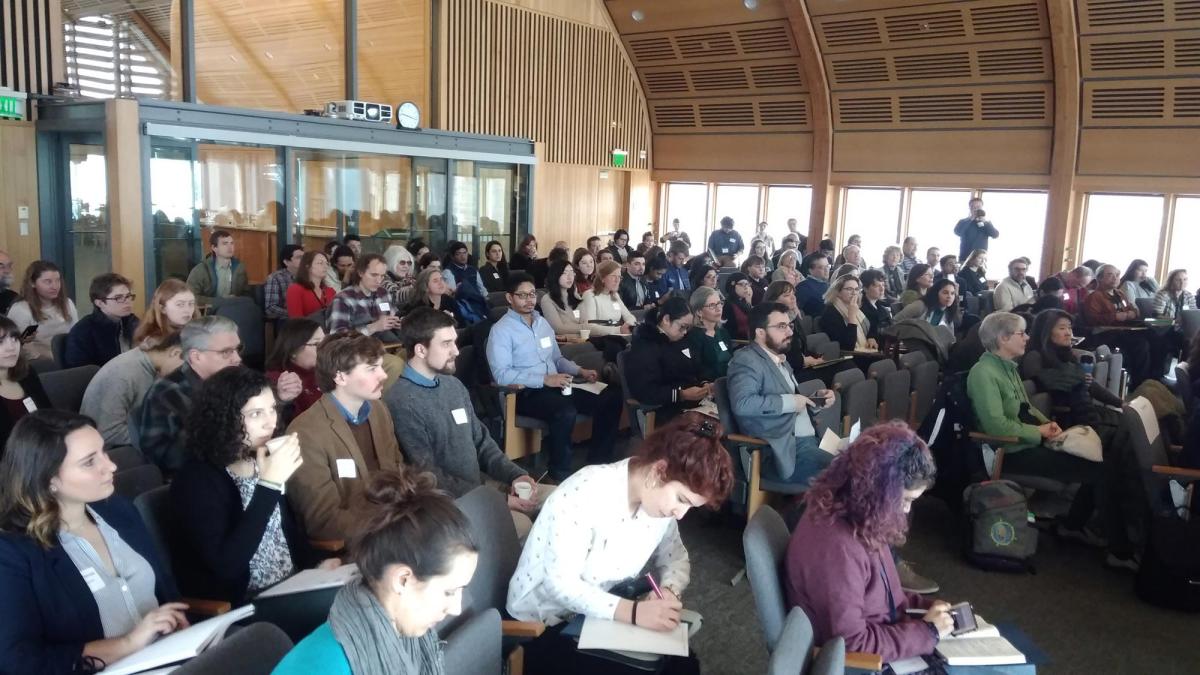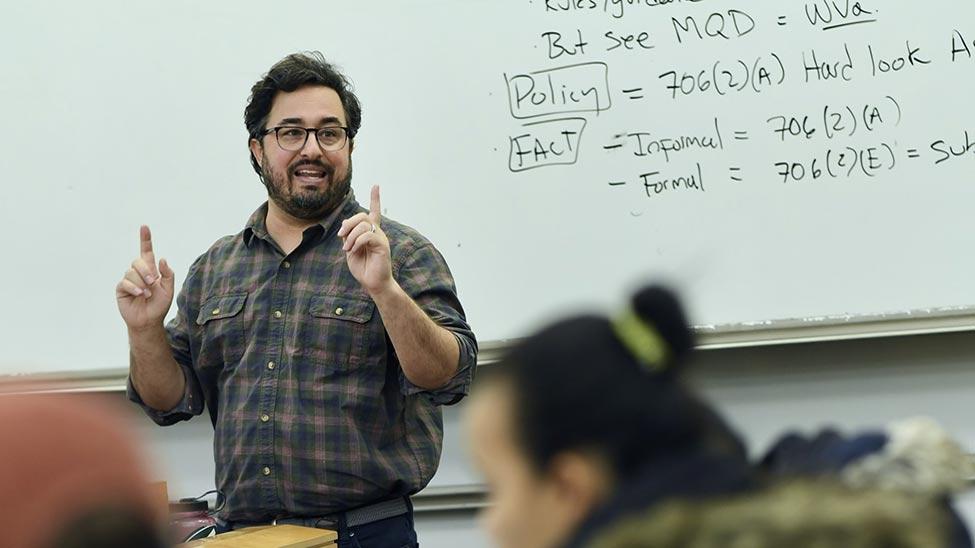
The Partnership Creating World-Class Environmental Leaders

A Pace education has never been confined to just the classroom, or even the physical borders of campus.
From our long-standing relationships with the Big Four accounting firms, to levergaging worldwide connections in tech through the Design Factory Global Network, to a renewed focus on humanities-based learning opportunities in our own backyard, our ever-expanding network of partnerships ensures that when it comes to real life learning, Pace truly walks the walk.
If you look closely, you’ll find that these sorts of symbiotic partnerships are everywhere. Take, for example, the Elisabeth Haub School of Law’s relationship with Yale University. For nearly 25 years, law students at Pace have had the option to pursue a JD from Haub Law and a Master’s in Environmental Management (MEM) from the Yale School of the Environment. This unique relationship enables Haub Law students–who are already earning a degree at the number one environmental law school in the country–to pair their JD with an interdisciplinary master’s degree at one of the most prestigious universities in the world.

For good reason, this partnership is more popular than ever, with a record number of applicants and admitted students over the last few years. To further bolster the program, three new joint degree options were recently added, including a JD/Master of Environmental Science (MESc), JD/Master of Forestry (MF), and a JD/Master of Forest Science (MFS).
“More and more Pace students have participated every year, and we’re at the pinnacle of this program in terms of the quality, breadth, and quantity of students who are participating. We’ve grown to become the main law school involved in the program in terms of number of students.”
These are the words of Haub Law Professor Josh Galperin, who has been involved with the program for roughly two decades–first as a student, then as a lecturer at Yale, and now currently, as the program director at Pace’s Haub Law. During this time, Galperin has witnessed the program’s impressive growth and ability to meet the evolving goals of students; particularly the way in which the program is able to empower students to meet the ever-important challenges of the climate crisis.
As Galperin emphasizes, the program is far from just a glossy item to feature on a resume. For anyone interested in pursuing a career in environmental law or as an environmental professional, the program’s interdisciplinary approach offers incredible value. Important skills learned in law school such as analyzing problems in a careful and precise way, thinking deeply about both sides of an argument, and learning how to read cases and law and make legal arguments are all incredible assets, but often not enough for aspiring interdisciplinary environmental professionals. Rather, these skills are best utilized when paired with deep knowledge about the environmental concern in question.
“Environmental law isn’t plain old lawyering,” emphasizes Galperin. “It involves negotiation, policymaking, public outreach, some awareness at least—if not expertise in—scientific issues and concerns. In many respects, this is what makes the program truly valuable.”
“Environmental law isn’t plain old lawyering. It involves negotiation, policymaking, public outreach, some awareness at least—if not expertise in—scientific issues and concerns. In many respects, this is what makes the program truly valuable.”
Allison Sloto ’16, now an associate at international law firm Milbank LLP, echoes this sentiment. A large part of her current practice entails representing lenders seeking to understand whether the large-scale renewable energy projects they are considering are fully compliant with environmental laws–which in turn requires Sloto to review and interpret the results of complex consultant reports which demand in-depth knowledge of the environmental issues at hand. She credits her experience in the program as instrumental in helping her build the skill set she now employs routinely.
“As an environmental lawyer it is critical to be comfortable with science, as an integral aspect of our job is working hand-in-hand with environmental consultants and interpreting environmental reports for material legal conclusions,” emphasizes Sloto. “My time at Yale allowed me to take classes in science, policy, and business, which exercise the mind in different ways. Having the adaptability to understand a scientific paper, or engage in expansive brainstorming with a business group (without immediately engaging my lawyer-brain to critique proposed ideas), has helped me in innumerable ways throughout my career.”

For students currently enrolled in the program, the benefit is clear. Lauren Lynam ’26 is a 2L with a multidisciplinary background in environmental science, economics, technology, and law. She sees the joint degree as a great way to help bolster her acumen at the intersection of business and environmental law.
“I possess the capability to influence business decision-making with respect to the environment, but I have yet to apply my various areas of expertise in harmony. Earning a Master’s in Environmental Management from the Yale School of the Environment will shift my multidisciplinary skills, to an interdisciplinary method in approaching intersected business and environmental issues,” says Lynam.
Having the adaptability to understand a scientific paper, or engage in expansive brainstorming with a business group (without immediately engaging my lawyer-brain to critique proposed ideas), has helped me in innumerable ways throughout my career.”
Brooke Mercaldi ’23, is now an attorney at the Marine Affairs Institute and Rhode Island Sea Grant Legal Program. Having majored in environmental science in as an undergrad, she wanted to expand and strengthen that knowledge–which she did through both immersing herself in coursework and as well as through a broad set of research opportunities.
While completing the Yale portion of the program Mercaldi served as a Research Assistant at the Climate Change and Animal Agriculture Litigation Initiative and for the Yale Center for Environmental Law and Policy, and was also a teaching fellow for two different schools. If that wasn’t enough, she also became involved in an environmental protection clinic at Yale. Mercaldi credits all of these experiences—in addition to the positions she held at Haub—to helping her build the diverse legal and environmental acumen that has enabled her to flourish in her current role.
“The program offered me a unique opportunity to expand my knowledge and skillsets, work with and learn from experts from around the world, participate in additional research opportunities, and network with members of the Yale community—all while enhancing my ability to holistically understand environmental issues and develop creative strategies and solutions ” said Mercaldi. “I was confident Haub Law’s opportunities in and reputation for environmental law and YSE’s environmental science and policy courses would help me achieve my career aspirations.”
Just like many partnerships at Pace, this joint degree program is designed to function in a naturally reciprocal manner. While someone less familiar with Haub may see the immediate benefit to Pace (Yale, after all, is a member of the Ivy League and is consistently ranked among the top schools in the world) this is a partnership that equally advantages Yale. As Galperin explains, the benefits go both ways.

“The relationship between Pace and Yale is not a one-way street,” says Galperin. Obviously it's a great opportunity for our students to connect with a much wider network and a really rich pool of resources and opportunities. But equally as important, Haub is the number one environmental law school in the country. It’s got a huge reputation that attracts students from all over the world with a diverse set of backgrounds and skills. And they arrive at the Yale School of the Environment bringing a really valuable perspective to that; the perspective of lawyers and law students who come from not just any law school, but the number one environmental law program in the galaxy. Yale really values the interdisciplinary nature and quality of thinking that our students bring to the program.”
As record temperatures and natural disasters continues to affect every corner of the globe—2024 was the hottest year on record, with an estimated $229 billion in damages from natural disasters—this partnership ensures that Pace students will continue to be on the forefront of environmental problem solving, particularly as natural climate solutions and carbon reduction solutions grow in importance and popularity. As Galperin emphasizes, students who are both lawyers and understand how certain aspects of the environment truly work—such as the interplay between forests and a surrounding environment—can make a considerable impact in helping to reduce the negative impacts of the climate crisis.
As the partnership continues to grow, Galperin and the faculty at Pace are excited to help guide the next generation of climate lawyers and policy professionals toward continued success as they seek to make a meaningful difference in the world.
“To pair the incredible skill set you learn as a law student—the skills of ‘lawyering’—with an interdisciplinary broad-based approach to environmental problem solving, allows students to have the precision of the lawyering tool with the real-world experience of the master’s degree. And that makes them second to none in terms of environmental lawyers and professionals.”
More from Pace Magazine
At Pace University, learning from the best isn't just a promise—it's a reality. Meet the seven extraordinary professionals-turned-professors shaping the next generation of leaders. From theater to law, nursing to AI, these educators bring world-class experience and passion to every lecture.
The days of John Gotti and The Godfather are long behind us, but organized crime has continued to evolve. A Pace student teams up with two faculty members to investigate.
When generative AI burst onto the scene, Seidenberg faculty were already deep into the work. Learn how the school’s legacy of AI excellence has set the stage for groundbreaking work today and is preparing Pace students for the possibilities of tomorrow.


